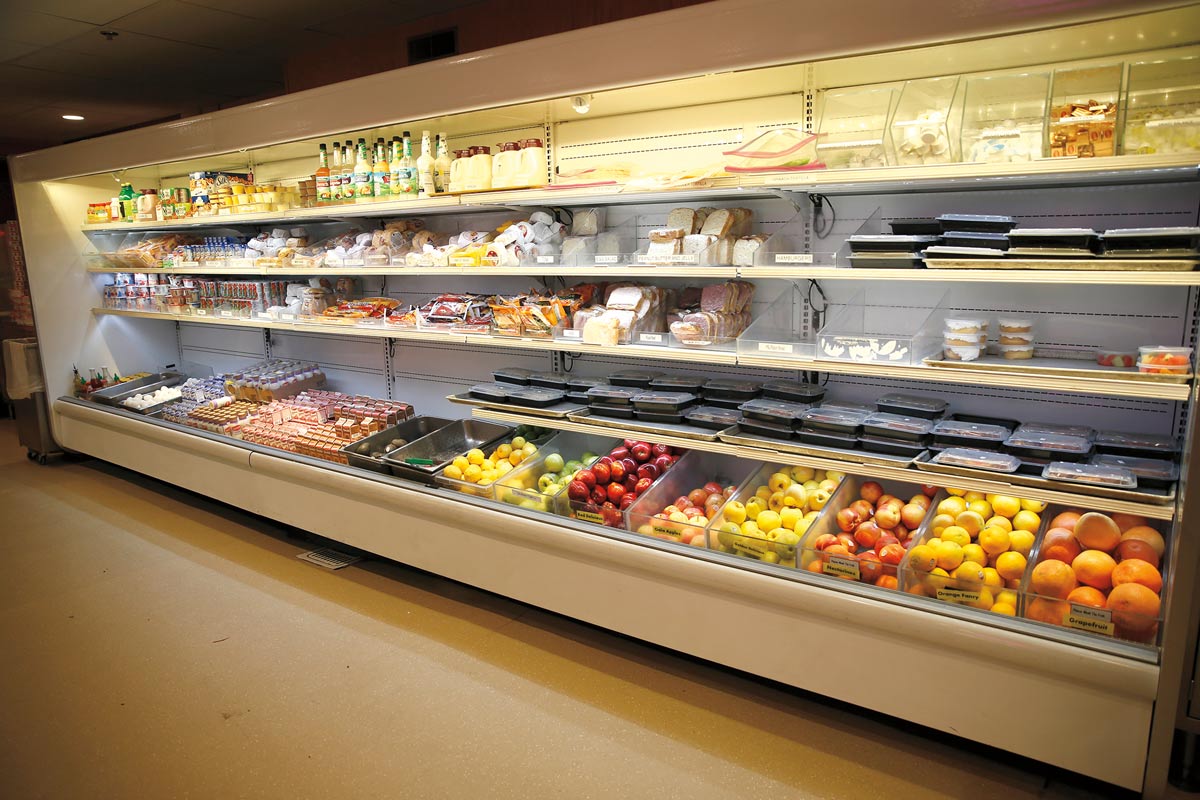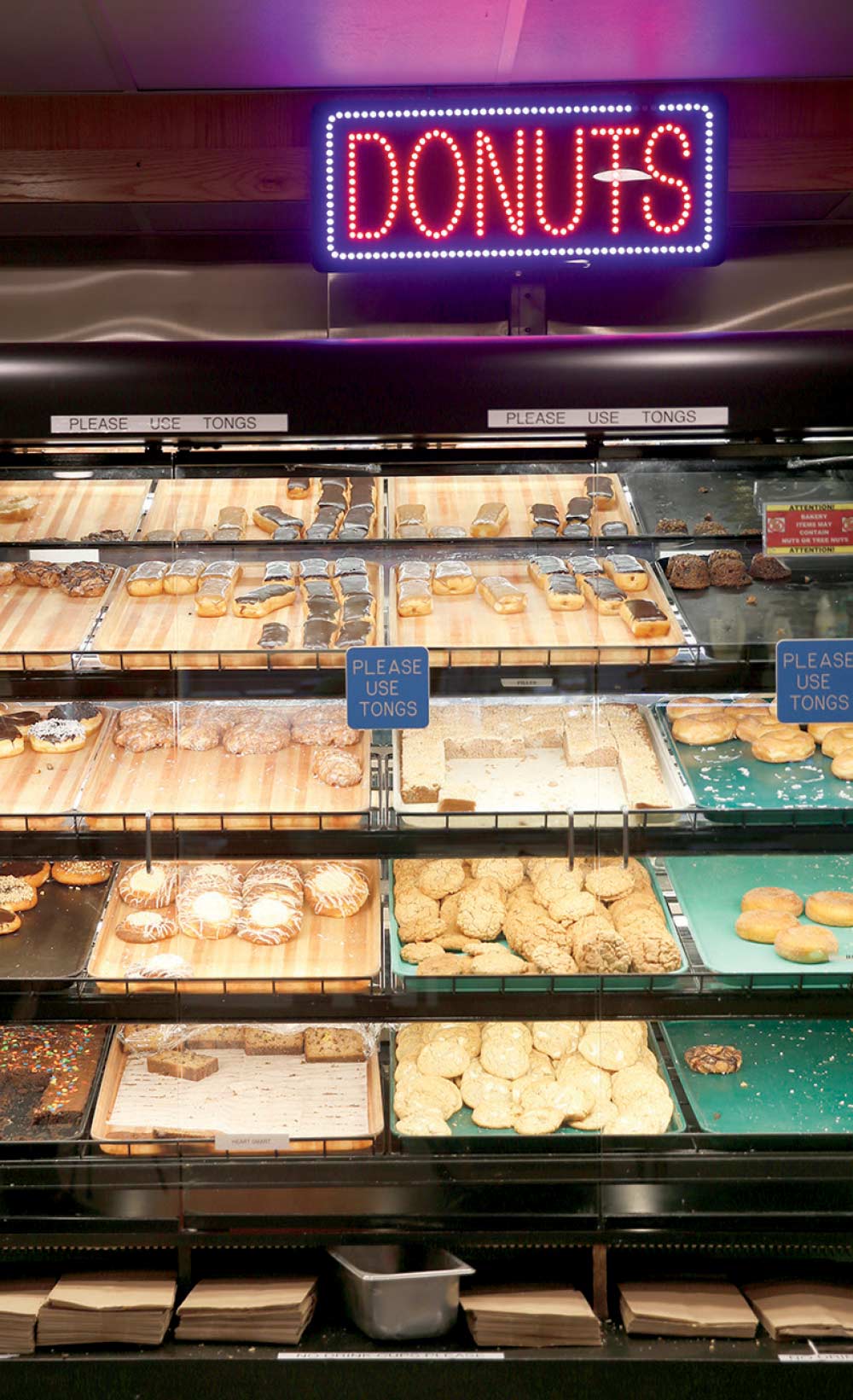

t takes a lot to keep Alaska’s remote worksites running smoothly. Whether it’s transporting goods and materials, maintaining operating equipment, or managing camp quarters, support service companies play an integral role in keeping the mining, oil and gas, and other critical industries open for business.
Perhaps the most vital of these services? Food. Catering camps provide the fuel for a workforce that spends 12-hour days hundreds of miles from home, weeks at a time. Good, hearty food–and lots of it–is what keeps them going.
“I think anybody up there will tell you one of the most important things for morale is food,” says Annette Sheppard, director of business development and external affairs at Denali Universal Services, which provides culinary, janitorial, housekeeping, and facility management services to remote workforces along the Trans Alaska Pipeline System, the North Slope, and at critical infrastructure projects across the state. “So, [employers] want to make sure they’re fed and happy and taking that social hour.”
But dishing up good eats in such rugged conditions isn’t without its challenges. Staving off mealtime monotony, delivering goods and supplies to remote locations—even dealing with the occasional bear meandering into the kitchen—there’s a lot more to contend with at remote camps than the typical workplace cafeteria.
“It is a logistical challenge,” says John Dittrich, vice president of ICE Services, which provides catering, lodging, and hospitality services at fourteen camps and hotels across the North Slope. “Certainly, it’s a lot more challenging than running a restaurant in Anchorage.”
“The most important thing is to accommodate what the client’s needs are,” says Jenny Dickinson, operations manager at Five Star Oilfield Services, which provides remote catering, hospitality, and camp services at eighteen locations across Alaska. “So, we work with them to provide a well-balanced menu and make sure we fit all of their requests in.”
Requests often involve specific menu items—prime rib or steak nights are almost standard on the North Slope—or themed dinner nights. Outside of those parameters, catering camps are generally given a fair amount of leeway in designing their menus.
“In some cases, customers are very specific,” Dittrich says. “[They’ll] want steak every Sunday or ‘Taco Tuesday.’ A lot of times they say, ‘Just use your best judgment.’”
That judgment has been honed through years of experience serving remote workers, learning what they like, and monitoring what’s popular, which sometimes comes down to something as seemingly simple as workers showing a preference for one brand over another, Dittrich says.
Sheppard of Denali Universal has noticed a change in eating habits as the workplace shifts from older to younger workers. They’ve grown to include not just specific dietary lifestyles, like ketogenic or paleolithic, but food trends she never thought would be welcome.
“Five months ago, we did a test with all the plant-based meats,” she says. “It was a huge hit. Cauliflower crust pizzas, the Impossible Burgers—people loved them, which was a surprise to me. But that’s something that’s standard on the menu now. So what we serve is based on what the population wants and responds to.”
No matter the dietary preferences, menus are typically scheduled on a five-week rotation. This not only helps maintain consistent meals across camps but makes procurement easier and keeps mealtimes from getting boring.
“If you have chicken parmigiana one night, probably five weeks from [then] you’ll have chicken parmigiana again,” Dittrich explains. “[For] people who are working a two-week on/two-week off or three-week on/three-week off shift, hopefully on a five-week rotation, you might see chicken parmigiana once this hitch. You see the same meal from time to time, but not every week.”
Denali Universal Services

Denali Universal Services
Five Star Oilfield Services operates several platform-based camps and front-loads them with supplies shipped via barge to minimize shipping costs, Dickinson says. When barges can’t get through the ice during winter, weekly helicopter flights to the platforms supplement the camps with fresh food and staples.
On the North Slope, Ice Services’ Deadhorse camps receive weekly van loads of food year-round, Dittrich says. For locations without year-round road access, like the Aurora Express Camp at Greater Moose’s Tooth or the Qiruk Camp at Point Thomson, they use ice roads to cross the Colville River or Rolligons to traverse the tundra to deliver non-perishables and minimize air freight costs.
Because working in a remote location means no quick trip to the local Fred Meyer when the kitchen’s running low on milk or eggs, buying and delivering non-perishable and frozen food in bulk ensures a healthy stock of supplies—without breaking the food budget.
“We’ve brokered a really good partnership with one of the largest buying groups from the Lower 48 that allows us to take advantage of some excellent buying opportunities,” Dittrich explains. “We purchase in volume and utilize local and national suppliers for different things. We’re always shopping for the best value, especially things that can be frozen or have a [long] shelf life.”
Chefs work with procurement to schedule orders, Sheppard says, making sure to build in lead time so it arrives when it’s needed.
“From the time they place an order to the time the food arrives is probably five days, but it does have to be planned,” she says. “When they want extra meals at Christmas, or crab, or wings for the Super Bowl, that has to be planned several weeks in advance to get to them on time.”
How much inventory each camp stocks is up to the client, but Sheppard says Denali Universal Services suggests three weeks’ worth to ensure an adequate supply in the event shipments are delayed.
“A couple of years ago the roads went out and [the camp] was getting kind of concerned,” she says. “At the end of the day, it all worked out. Since then our protocols have changed, so there’s a bigger inventory. I don’t think anybody’s going to be hungry or run out of toilet paper.”
“I think all of the companies have learned that well-rested and well-fed employees make for safer and happier employees,” Dittrich says.
Unless the client requests otherwise, catering camps provide a minimum of three hot meals a day served at designated times, with the option for a fourth.
Meals are generally served buffet-style; space constraints at the smaller remote sites make it difficult to offer made-to-order, Sheppard says, though breakfast is often an exception.
“You can’t do fried eggs and put them on the buffet and expect people to eat them,” she says.
In addition to the standard five-week meal rotation to keep meal repetition at a minimum, catering services provide several entrée and vegetable options per meal, as well as soups, fruits, a salad bar, and fresh-baked desserts.
Dinners may include a chicken or fish option, while rotating in special requests, such as Mexican night or prime rib, Sheppard says.
During the summer, barbecuing takes center stage.
“Smoked prime rib or pork ribs, beef brisket, and things like that are very popular,” Dittrich says. “We also have a fresh fish program in the summer, which is something we take pride in.”
Because workers can’t always make it back to camp for lunch, boxed lunches are often the best choice for refueling on the go. Sometimes that means creating a lunch with food from the spike room—a 24-hour convenience store of sorts available at every camp and stocked with portable snacks like yogurt, string cheese, chips, and fruit, as well as fixings to make sandwiches. Other times, the kitchen boxes up the meal.
Denali Universal Services
Dinners may include a chicken or fish option, while rotating in special requests, such as Mexican night or prime rib, Sheppard says.
During the summer, barbecuing takes center stage.
“Smoked prime rib or pork ribs, beef brisket, and things like that are very popular,” Dittrich says. “We also have a fresh fish program in the summer, which is something we take pride in.”
Because workers can’t always make it back to camp for lunch, boxed lunches are often the best choice for refueling on the go. Sometimes that means creating a lunch with food from the spike room—a 24-hour convenience store of sorts available at every camp and stocked with portable snacks like yogurt, string cheese, chips, and fruit, as well as fixings to make sandwiches. Other times, the kitchen boxes up the meal.

Denali Universal Services
Director of Business Development and External Affairs, Denali Universal Services
Every camp also offers an assortment of fresh-baked pastries, like homemade cookies, cakes, pies, muffins, and other desserts at every meal and in the spike room. Offering made-from-scratch desserts—as opposed to popping open a tube of Pillsbury cinnamon rolls—is just another way of contributing to the quality of life at the camps.
“It goes back to the whole social aspect and good food,” she explains. “You got to make people happy to come to work and be there.”
Catering services are also adept at using leftovers to minimize waste. Steak and potatoes from last night’s dinner become tomorrow’s soup, or burritos will be individually wrapped and available in the spike room for after-hours snacking or on-the-go lunches, Dittrich says.
And they’re constantly implementing new ideas to keep workers happy.
“We’ve created these hydrating water infusion stations where [workers] can pick various fruits that get infused in the water,” Dittrich says. “We also offer smoothies and fresh, cold-pressed juices at some of our locations. We just try to do those things to make people enjoy what they’re doing.”
“It helps to have a fantastic holiday dinner to look forward to when you are missing these special times at home,” Dickinson says.
Meals include the traditional holiday fare, such as turkey and all the fixings for Thanksgiving and ham on Easter, along with splurge items to make the day extra special.
“We like to go over the top for holidays,” Dickinson says. “Holiday dinners are always memorable. Our cooks prepare crab, T-bone steaks, lobster tails, filet mignon, and all of the side dishes to go with it.”
Holidays also give staff a chance to get creative and make the dining room festive.
“You don’t get to run down the street and get party decorations, so it’s fun to see the staff get creative and do ice sculptures,” Sheppard says. “The residents love it, the clients love it, everybody has a good time.”
Catering camps also plan meals for special guests and company celebrations. Dittrich says ICE Services has catered meals for out-of-state congressional leaders touring Alaska, as well as employee appreciation dinners.
And like any kitchen staff, they love getting appreciative words from the clients they work so hard to make feel at home.
“When clients call me to complain that the crews are gaining weight, that’s when we know our Five Star employees are doing an excellent job,” Dickinson says. “We get these calls often, all in good fun.” ![]()